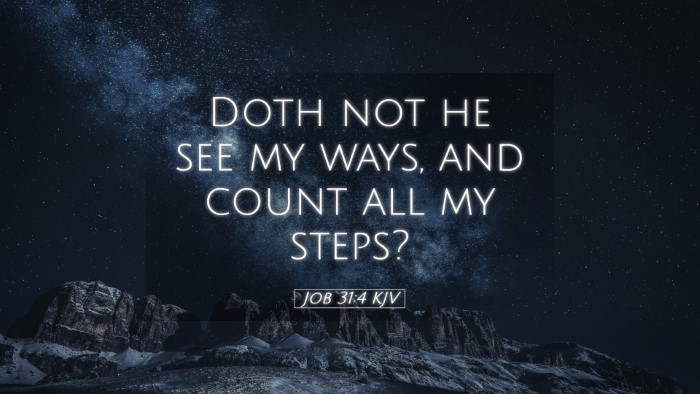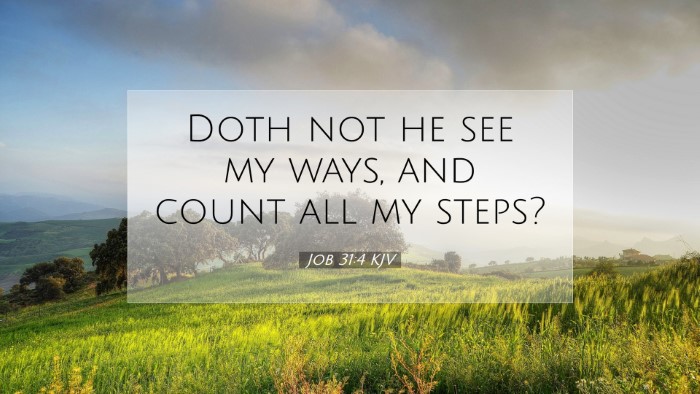Commentary on Job 31:4
Job 31:4 states, "Does not He see my ways and count all my steps?" This verse reflects Job's profound awareness of the divine omniscience and his plea for vindication.
Scholars and theologians have pondered over the implications of this verse, drawing insights from public domain commentaries.
Understanding Divine Omniscience
The assertion in Job 31:4 emphasizes that God possesses complete knowledge of human actions and intentions.
Matthew Henry notes that this awareness encompasses all our ways, a reminder to humans that they cannot escape God's scrutiny.
Henry elaborates on the importance of living righteously, suggesting that Job sought to showcase his integrity by appealing to this divine oversight.
The Context of Job’s Righteousness
Adam Clarke provides context to Job's lament by discussing the trials he endured.
Job was not merely expressing despair; he was confident in his innocence despite overwhelming suffering.
Clarke emphasizes that this inquiry into God's omniscience serves both as a comfort to Job and a challenge to his friends, who questioned his integrity.
Job's Integrity and Accountability
-
Albert Barnes interprets Job's declaration as a means of asserting his integrity.
He argues that Job was aware of God’s scrutiny and held himself accountable for his actions, underscoring the ethical and moral dimensions of human conduct.
-
Barnes suggests that this verse illustrates Job’s deep introspection and self-examination, which he believed would be judged by the divine.
The Nature of God’s Observation
The phrase "He sees my ways" evokes a notion of a God who is actively engaged in His creation.
Both Clarke and Barnes affirm that God's sight is not passive; rather, it serves as a means to correct, judge, and ultimately redeem.
Arguments Against Misjudgment
Job's assertion can also be viewed as a counter to his friends' accusations.
Matthew Henry remarks that Job’s confidence in God's awareness was a rebuttal to the false charges of wrongdoing laid against him.
This raises critical reflections on the nature of suffering and the human tendency to misjudge others based on their circumstances.
The Assurance of Justice
Job's plea for God to consider his ways aligns with a biblical theology of justice.
Adam Clarke comments that despite the whirlwind of affliction, Job believed in a God who would ultimately deliver justice.
He held on to the conviction that even in despair, there is hope for vindication.
Personal Reflection and Application
For pastors, students, and scholars, Job 31:4 presents an opportunity for reflection on personal integrity and accountability in the light of divine awareness.
This verse challenges readers to examine their lives in relation to God's omniscience, as emphasized by the commentaries.
- Self-Examination: Regularly assess your actions and motives before God.
- Integrity in Trials: Hold steadfast to your convictions, especially when faced with adversity.
- Understanding God’s Justice: Trust that God will ultimately reveal truth and administer justice in His timing.
Conclusion
In conclusion, Job 31:4 encapsulates profound theological and existential questions regarding the nature of God’s oversight and justice.
By engaging with the insights from Henry, Clarke, and Barnes, readers gain a deeper understanding of Job’s assertion and its implications for faith and conduct.
The verse serves as both a reminder and a challenge for believers to live with integrity under the awareness of a just and all-seeing God.


